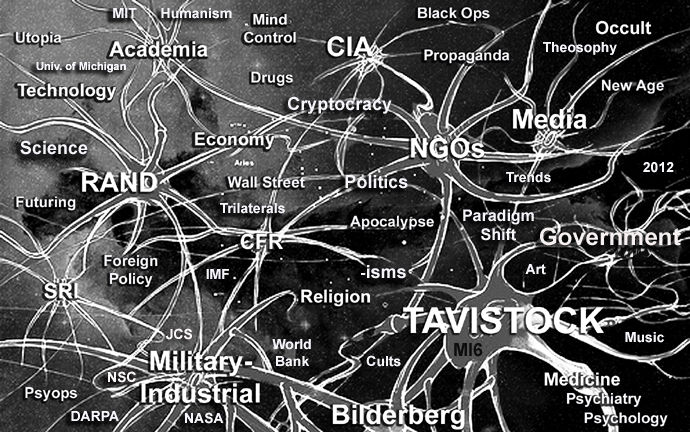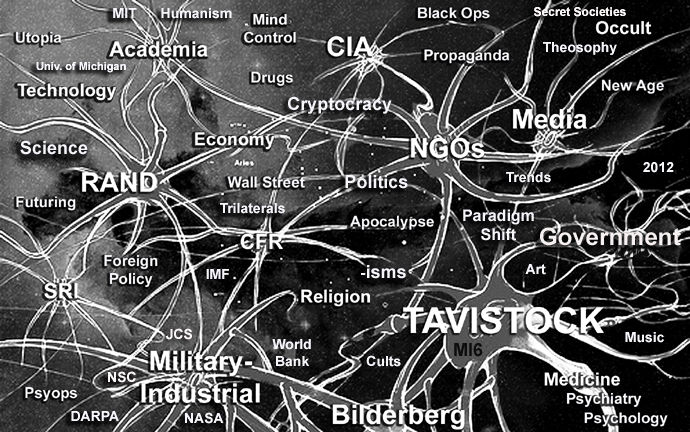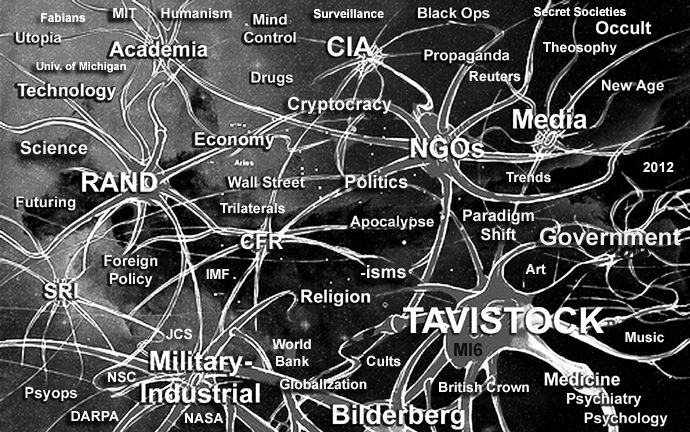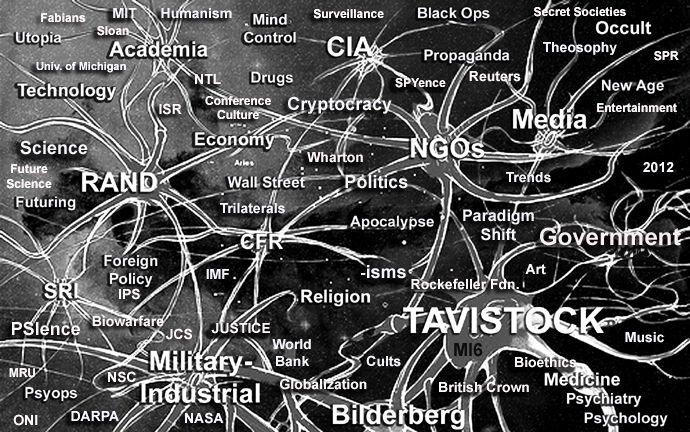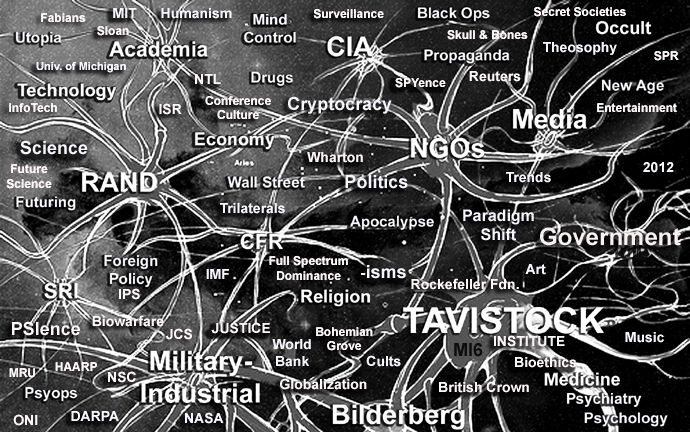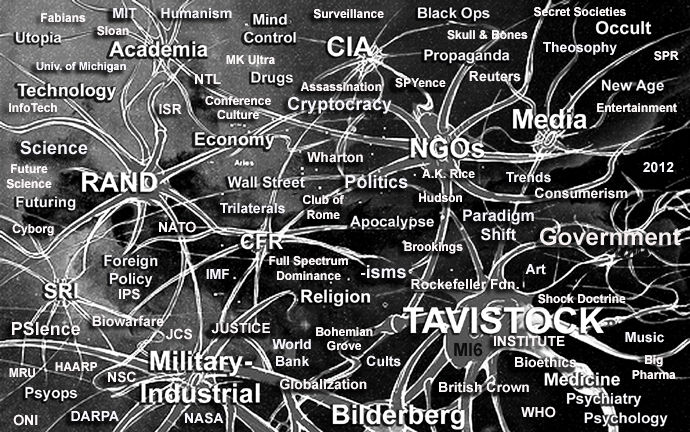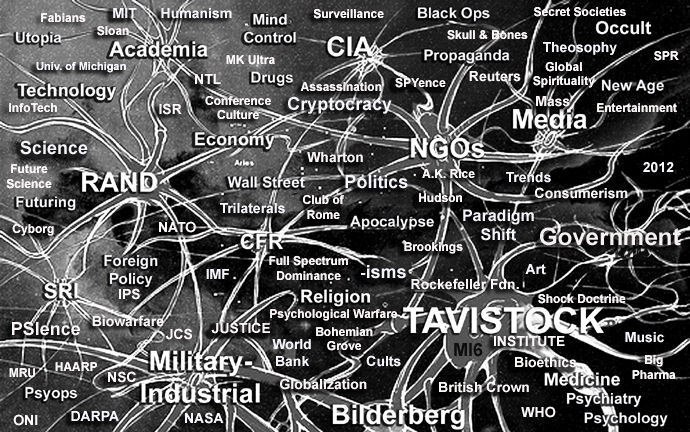TAVISTOCK NERVE CENTERS
Tavistock Nerve Centers - The Architecture of Control
Ideological Subversion by Shock Doctrine for Holographic Control
see http://tavistockagenda.iwarp.com/whats_new_32.html
for briefs on acronyms
*
THE HYDRA HEAD OF THINKTANK PROLIFERATION
iLLUSTRATION: http://www.ktli.org/docs/African%20Centered%20%20_21st%20Century%20Mind%20Control_%20Revised.pdf
The Science of Mass Manipulation through crisis creation. An Introduction to the Tavistock Institute of Human Relations
“In our dreams, people yield themselves with perfect docility to our molding hands.” – Fredreick Gates Chairman of the Rockefeller established General Education Board (The World’s Work, August 1912)
Created at Oxford in 1921 by the Royal Institute for International affairs, with later funding from the Rockefeller Foundation, the Tavistock Institute of Human Relations is the nerve center for the global manipulation of human consciousness. Not long after Tavistock was set up by co-founder John Rawlings Rees and others, it became the core of Britain’s Psychological Warfare Bureau, studying the effects of shell shock on British soldiers. Tavistock also played a crucial role in the creation of the OSS (the precursor to the CIA), under the guidance of Dr. Kurt Lewin, with help from Allen Dulles, the German Nazis and the U.S. Joint Chiefs of Staff.
“Research into the use of microwave weapons and their use for mind control began in the 1950s at Tavistock. The UK institute was researching into ways of mind controlling the British population without them knowing.” – im Rifat Microwave Mind Control
Aside from helping to create the CIA, Tavistock was also the major force behind the formation of NATO and is deeply connected to the Club of Rome.
The Club of Rome works with Tavistock to create propaganda and crisis in order to manipulate the world’s population in a pre-determined direction, toward a collectivist, one world socialistic dictatorship.
Today, Tavistock operates through a vast network of think tanks, NGOs, universities and media outlets to influence public opinion, while breaking down the moral fabric that has held the West together using scientifically-crafted techniques of manipulation.
Tavistock has played an important role in the creation of several institutional centers, including, Stanford Research Institute, The Wharton School at the University of PA & The Sloan School ar MIT. Other groups that work closely with Tavistock include…
The Heritage Foundation
The RAND Corporation
The Hudson Institute
Esalen
Brookings Institution
MIT
Institute for Policy Studies
Walden Research
An important role Tavistock has played in the corporate world, via the National Training laboratories, is the sponsoring of group “sensitivity” and “diversity” programs designed to erase a person’s individuality so that they become a “team player”. The fact is that ‘political correctness’ is all about creating uniformity. Individuality is one of the biggest obstacles in the way of the New World Order. They want a public that is predictable and conditioned to do as it’s told without asking questions.
SRI is the 2nd largest think tank in the US. RAND is the biggest militaryinfluence.
RAND RESEARCH AND DEVELOPMENT CORPORATION
Without a doubt, RAND is THE think tank most beholden to Tavistock Institute and certainly the RIIA's most prestigious vehicle for control of United States policies at every level. Specific RAND policies that became operative include our ICBM program, prime analyses for U.S. foreign policy making, instigator of space programs, U.S. nuclear policies, corporate analyses, hundreds of projects for the military, the Central Intelligence Agency (CIA) in relation to the use of mind altering drugs like peyote, LSD (the covert MK-ULTRA operation which lasted for 20 years).
[Editor, Tim Aho's note: The founder of the Rand Corporation, Herman Kahn, also founded the Hudson Institute in 1961. In Educating for the New World Order, B.K. Eakman tells of a training manual for "change agents" developed for the U.S. government by Rand Corporation: ". . . a how-to manual with a 1971 U.S. Office of Education contract number on it entitled 'Training for Change Agents'; seven volumes of 'change agent studies' commissioned by the U.S. Office of Education to the Rand Corporation in 1973-74; scores of other papers submitted by behaviorist researchers who had obtained grants from the U.S. Office of Education for the purpose of exploring ways to 'freeze' and 'unfreeze' values, 'to implement change,' and to turn potentially hostile groups and committees into acquiescent, rubber-stamp bodies by means of such strategies as the 'Delphi Technique.'" (p. 118)]
Some of RAND's clients include:
American Telephone and Telegraph Company (AT&T)
Chase Manhattan Bank
International Business Machines (IBM)
National Science Foundation
Republican Party
TRW
U.S. Air Force
U.S. Department of Health
U.S. Department of Energy
There are literally THOUSANDS of highly important companies, government institutions and organizations that make use of RANDS's services. To list them all would be impossible. Among RAND's specialities is a study group that predicts the timing and the direction of a thermonuclear war, plus working out the many scenarios based upon its findings. RAND was once accused of being commissioned by the USSR to work out terms of surrender of the United States Government, an accusation that went all the way to the United States Senate, where it was taken up by Senator Symington and subsequently fell victim to scorn poured out by the establishment press. BRAINWASHING remains the primary function of RAND.
These institutions are among those that fund The UNIFORM LAW FOUNDATION, whose function is to ensure that the Uniform Commercial Code remains the instrument for conducting business in the United States.
*
This is a study issue by U.S. Foreign Policy Agenda. It examines the unique role played by public policy research and analysis organizations, or "think tanks," in the formulation of U.S. foreign policy. A leading State Department official outlines the principal benefits that think tanks offer to U.S. policy-makers. Two experts review the history and evolution of think tanks' involvement in U.S. foreign policy and cite the recent proliferation of these institutions around the world. Two think tank presidents and an executive vice president explain how a leading U.S. think tank operates, the special role of a think tank created by the U.S. Congress, and how one of the nation's largest think tanks works with the U.S. military.
http://www.alzaytouna.net/arabic/data/attachments/2007/ENG_Role-Think-Tanks-USA_USINFO-Nov-2002.pdf
*Think tanks that work with defense and intelligence agencies once focused exclusively on
regional and functional topics, but these organizations are now also being called upon to
help the military address the new challenge of terrorism and homeland security, says
RAND Executive Vice President Michael D. Rich. RAND researchers, who have been
studying terrorism for more than 30 years, are now helping decision-makers develop a
comprehensive analytical approach to defending against terrorist attacks and, at the same
time, they are doing an increasing amount of research for other governments throughout the world."-Michael Rich, RAND
From the perspective of U.S. policy-makers, today's think tanks offer five principal benefits,
according to Ambassador Richard N. Haass, who is Director of Policy and Planning at the
State Department. He says they generate “new thinking” among U.S. decision-makers,
provide experts to serve in the administration and Congress, give policy-makers a venue in
which to build shared understanding on policy options, educate U.S. citizens about the
world, and provide third-party mediation for parties in conflict. -By Richard N. Haass
Director of Policy and Planning
U.S. Department of State
“Of the many influences on U.S. foreign policy formulation, the role of
think tanks is among the most important and least appreciated.”
— Richard Haass
Director of Policy and Planning
U.S. Department of State
“There are moments in the evolution of U.S. foreign policy where
think tanks have had a decisive impact in reshaping conventional wisdom
and setting a new course on a key strategic issue.”
— Ronald D. Asmus
Senior Transatlantic Fellow, German Marshall
Fund of the United States, and Adjunct Senior
Fellow, Council on Foreign Relations
Policy-makers have increasingly turned to independent public policy research
organizations, commonly known as “think tanks,” for information and analysis that
is timely, understandable, reliable, accessible and useful, says James G. McGann, a Senior
Fellow at the Foreign Policy Research Institute and President of McGann Associates.
The challenge for the new millennium, he says, “is to harness the vast reservoir of
knowledge, information, and associational energy that exist in public policy research
organizations in every region of the world.”
The approximately 1,500 think tanks in the United
States “engage in a range of policy-related
activities, and comprise a diverse set of institutions
that have varied organizational forms,” says James
G. McGann of the Foreign Policy Research
Institute.
*
Sample Photo 1
Sample Photo 2
Sample Photo 3
Sample Photo 4
Sample Photo 5
Sample Photo 6
Centrist
Centrist think tanks include the Atlantic Council of the United States and Center for Strategic and International Studies, non-partisan foreign policy-oriented organizations, the Institute for Collaborative Engagement, a non-partisan internationally-focused organization, Center for Strategic and Budgetary Assessments, a non-partisan defense-oriented organization, and the The Lincoln Square Institute, a non-partisan presidential election forum.
- American Consumer Institute
- American Iranian Council
- American Israel Public Affairs Committee
- American Institute for Economic Research
- Askew Institute on Politics and Society
- Aspen Institute
- Atlantic Council of the United States
- Bipartisan Policy Center
- Carnegie Endowment for International Peace
- Center for Advanced Defense Studies
- Center for a New American Security
- Center for Global Development
- Center for Hemispheric Policy
- Center for Strategic and International Studies
- Committee for Economic Development
- Constitution Project
- CFED
- Council on Foreign Relations
- Group of Thirty
- Henry L. Stimson Center
- Information Technology and Innovation Foundation
- International Center for Research on Women
- National Bureau of Asian Research
- New America Foundation
- Pew Research Center
- RAND Corporation
- Reform Institute
- Resources for the Future
- Urban Institute
- WestEd
- Woodrow Wilson International Center for Scholars
Conservative
Modern conservatism is associated with some of the foreign policy initiatives of think tanks such as the American Enterprise Institute (AEI) and the Project for the New American Century (PNAC). The Claremont Institute and the Heritage Foundation are more traditional conservative think tanks.
- American Enterprise Institute
- Center for Immigration Studies
- Center for Security Policy
- Claremont Institute
- Committee on the Present Danger
- Foreign Policy Research Institute
- Fusion Energy Foundation
- Heritage Foundation
- Hoover Institution
- Hudson Institute
- Manhattan Institute
- Middle East Forum
- National Center for Policy Analysis
- The Nixon Center
- Pacific Research Institute
- Project for the New American Century
Liberal
On the other side of the political spectrum are think tanks such as the Institute for Policy Studies and the Center for American Progress. Economic Policy Institute is a prominent liberal think tank whose research emphasizes interests of low-income and middle-income workers. The Roosevelt Institution is pushing the think tank model by attempting to organize university and college student bodies into effective think tanks. The Progressive Policy Institute is a "New Democrat" organization focused on moving the Democratic party in a more centrist direction. The Brookings Institution is a center-left organization considered the oldest think tank in America.
- Brookings Institution
- Center for American Progress
- Center for Defense Information
- Center for Economic and Policy Research
- Center for International Policy
- Center for an Urban Future
- Center on Budget and Policy Priorities
- The Century Foundation
- Commonweal Institute
- Council on Hemispheric Affairs
- Demos
- Drum Major Institute
- Economic Policy Institute
- Global Financial Integrity
- Institute for Policy Studies
- Joint Center for Political and Economic Studies
- New Democrat Network
- National Security Network
- Progressive Policy Institute
- Roosevelt Institution
- World Resources Institute
LIBERTARIAN
The most prominent is the Cato Institute, a libertarian think tank based in Washington, DC.
- Atlas Economic Research Foundation
- The Buckeye Institute
- Cascade Policy Institute
- Cato Institute
- Competitive Enterprise Institute
- Foundation for Economic Education
- Foundation for Rational Economics and Education
- Goldwater Institute
- Heartland Institute
- Independent Institute
- James Madison Institute
- Lexington Institute
- Ludwig von Mises Institute
- Mackinac Center for Public Policy
- Mercatus Center
- Progress and Freedom Foundation
- Reason Foundation
- Show-Me Institute
